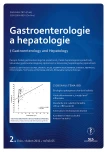-
Medical journals
- Career
Quantitative testing in colorectal cancer screening – a view of the near future
Authors: J. T. Kovářová
Authors‘ workplace: IV. interní klinika VFN a 1. LF UK Praha
Published in: Gastroent Hepatol 2011; 65(2): 90-93
Category: Clinical and Experimental Gastroenterology: Review Article
Overview
The author offers a systematic account of the new generation of quantitative immunochemical fecal occult blood tests, and outlines a scheme for their integration into the existing Czech program that screens for colorectal cancer. The characteristics of the quantitative immunochemical test (q-FIT) are described, as well as the types of the fecal occult test (FOBT), and their advantages and disadvantages, together with possible ways of the incorporating q-FIT into the colorectal cancer screening program in the Czech Republic. The inclusion of q-FIT in the Czech colorectal cancer screening program, combined with the existing primary screening colonoscopy, could make a contribution to effectiveness.
Key words:
cut off – quantitative immunochemical test – colorectal cancer – screening – fecal occult blood test
Sources
1. Dušek L, Abrahámová J, Mužík J et al. Populační odhady počtu nemocných s kolorektálním karcinomem v ČR – jeden z nástrojů hodnocení včasné diagnostiky časných stadií a rekurence onemocnění. Farmakoterapie – speciální příloha Kolorektální karcinom 2009; 11–20.
2. Zavoral M, Suchanek S, Zavada F et al. Colorectal cancer screening in Europe. World J Gastroenterol 2009; 15(47): 5907–5915.
3. Rossum LG, Rijn AF, Laheij RJ et al. Random comparison of guaiac and immunochemical fecal occult blood tests for colorectal cancer in a screening population. Gastroenterology 2008; 135(1): 82–90.
4. Levi Z, Rozen P, Hazazi R et al. A Quantitative immunochemical fial occult blood test for colorectal neoplasia. Ann Intern Med 2007; 146(4): 244–255.
5. Dubská L, Nechvátal J. Kvantitativní stanovení hemoglobinu ve stolici, Laboratorní technologie. http://www.stapro.cz/bullfons/32009/labo1.pdf
6. Mandel JS, Bond JH, Church TR et al. Reducing mortality from colorectal cancer by screening for fecal occult blood. N Engl J Med 1993; 329(9): 672.
7. Mandel JS, Church TR, Bond JH et al. The effect of fecal occult-blood screening on the incidence of colorectal cancer. N Engl J Med 2000; 343(22): 1603–1607.
8. Hardcastle JD, Chamberlain JO, Robinson MH et al. Randomised controlled trial of faecal-occult-blood screening for colorectal cancer. Lancet 1996; 348(9040): 1472–1477.
9. Hundt S, Haug U, Brenner H. Comparative evaluation of immunochemical fecal occult blood tests for colorectal adenoma detection. Ann Intern Med 2009; 150(3): 162–169.
10. Vilkin A, Rozen P, Levi Z et al. Performance characteristic and evaluation of an automated-developed and quantitative, immunochemical, fecal occult blood screening test. Am J Gastroenterol 2005; 100(11): 2519–2525.
11. Grazzini G, Visioli CB, Zorzi M et al. Immunochemical faecal occult blood test: number of samples and positivity cutoff. What is the best strategy for colorectal cancer screening? Br J Cancer 2009; 100(2): 259–265.
12. Rossum LG, Rijn AF, Oijen MG et al. False negative fecal occult blood test due to delayed sample return in colorectal cancer screening. Int J Cancer 2009; 125(4): 746–750.
13. Grazzini G, Ventura L, Zappa MS et al. Influence of seasonal variations in ambient temperatures on performance of immunochemical faecal occult blood test for colorectal cancer screening: observational study from the Florence distrikt. Gut 2010; 59(11): 1511–1515.
14. Levi Z, Hazazi R, Rozen P et al. A quantitative immunochemical faecal occult blood test is more efficient for detecting significant colorectal neoplasia than a sensitive guaiac test. Aliment Pharmacol Ther 2006; 23(9): 1359–1364.
Labels
Paediatric gastroenterology Gastroenterology and hepatology Surgery
Article was published inGastroenterology and Hepatology

2011 Issue 2-
All articles in this issue
- What prof. Mařatka wrote also about
- The jubilee year
- Aetiology and pathogenesis of ulcerative colitis. Still more questions than clear answers
- Recommended procedure for small bowel examination in patients with Crohn’s disease
- Influence of albuminemia on the pharmacokinetics of infliximab in patients with inflammatory bowel diseases
- Biological treatment of patient with ulcerative colitis during pregnancy
- 10th anniversary of founding of the ECCO and 6th ECCO congress in Dublin
- Endoscopic submucosal dissection in the treatment of recurrent high-grade neoplasia of the rectum
- Obtaining biopsies during endoscopic investigation of the gastrointestinal tract for selected inflammatory disorders
- Quantitative testing in colorectal cancer screening – a view of the near future
- Gastrointestinal manifestation of Henoch-Schönlein purpura mimicking acute pancreatitis
- Highlights of the 15th Hradec days of gastroenterology and hepatology
- Interview with prof. dr. Petr Dítě, DrSc., the president of EAGE (European Association for Gastroenterology and Endoscopy) and the director of 7th course EAGE for young gastroenterologists
- Ostrava live endoscopy March 18th 2011
- Gastroenterology and Hepatology
- Journal archive
- Current issue
- Online only
- About the journal
Most read in this issue- Obtaining biopsies during endoscopic investigation of the gastrointestinal tract for selected inflammatory disorders
- Recommended procedure for small bowel examination in patients with Crohn’s disease
- Quantitative testing in colorectal cancer screening – a view of the near future
- Aetiology and pathogenesis of ulcerative colitis. Still more questions than clear answers
Login#ADS_BOTTOM_SCRIPTS#Forgotten passwordEnter the email address that you registered with. We will send you instructions on how to set a new password.
- Career

